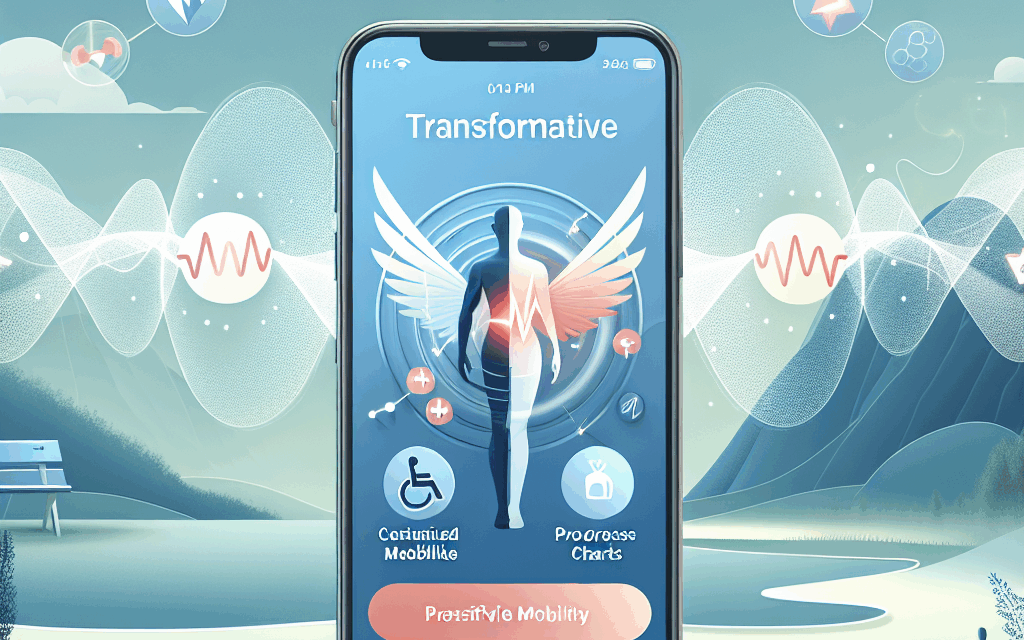Transform Your Life: Embrace a Personalized Mobility App to Alleviate Pain
In today’s fast-paced world, many individuals suffer from chronic pain, whether due to injuries, medical conditions, or lifestyle choices. The impact of pain on daily life can be debilitating, affecting not only physical health but also mental well-being. Fortunately, advancements in technology have led to the development of personalized mobility apps designed to help users manage and alleviate pain effectively. This article explores how these apps can transform lives by providing tailored solutions for pain management.
Understanding Chronic Pain and Its Impact
Chronic pain is defined as pain that persists for weeks, months, or even years. It can stem from various sources, including injuries, arthritis, fibromyalgia, and other medical conditions. According to the American Academy of Pain Medicine, approximately 100 million Americans suffer from chronic pain, making it a significant public health issue.
The impact of chronic pain extends beyond physical discomfort. It can lead to:
- Emotional Distress: Chronic pain often results in anxiety, depression, and feelings of helplessness.
- Reduced Quality of Life: Individuals may find it challenging to engage in daily activities, work, or social interactions.
- Financial Burden: The cost of medical treatments, therapies, and lost productivity can be substantial.
Understanding the multifaceted nature of chronic pain is crucial for developing effective management strategies. This is where personalized mobility apps come into play, offering tailored solutions that address individual needs and preferences.
The Rise of Personalized Mobility Apps
The advent of smartphones and wearable technology has revolutionized the way we approach health and wellness. Personalized mobility apps leverage these advancements to provide users with customized pain management solutions. These apps often include features such as:
- Activity Tracking: Users can monitor their physical activity levels, helping them identify patterns that may contribute to pain.
- Exercise Recommendations: Based on user data, apps can suggest specific exercises to strengthen muscles and improve mobility.
- Pain Journals: Users can log their pain levels, triggers, and responses to treatments, providing valuable insights for both users and healthcare providers.
- Telehealth Integration: Many apps offer the option to connect with healthcare professionals for virtual consultations and personalized advice.
Research indicates that personalized approaches to pain management can lead to better outcomes. A study published in the journal Pain Medicine found that patients who used personalized pain management apps reported a significant reduction in pain levels and improved overall well-being.
Key Features of Effective Mobility Apps
When selecting a mobility app for pain management, it is essential to consider the features that can enhance the user experience and effectiveness. Here are some key features to look for:
- User-Friendly Interface: An intuitive design ensures that users can navigate the app easily, regardless of their tech-savviness.
- Customization Options: The ability to tailor settings, notifications, and recommendations based on individual preferences is crucial for engagement.
- Data Security: Given the sensitive nature of health data, robust security measures should be in place to protect user information.
- Community Support: Many successful apps include forums or chat features that allow users to connect with others facing similar challenges.
- Integration with Wearable Devices: Compatibility with fitness trackers and smartwatches can enhance data collection and provide real-time feedback.
For example, the app “MyPainDiary” allows users to track their pain levels, medications, and triggers while providing insights into patterns over time. This data can be invaluable for both users and healthcare providers in developing effective treatment plans.
Case Studies: Success Stories of Mobility App Users
Real-life success stories can illustrate the transformative power of personalized mobility apps. Here are a few case studies that highlight how these tools have positively impacted individuals dealing with chronic pain:
Case Study 1: Sarah’s Journey with Fibromyalgia
Sarah, a 35-year-old woman diagnosed with fibromyalgia, struggled with widespread pain and fatigue for years. Traditional treatments provided limited relief, and she often felt isolated in her experience. After discovering a personalized mobility app, she began tracking her symptoms and identifying triggers related to her diet and activity levels.
By utilizing the app’s exercise recommendations, Sarah gradually incorporated gentle yoga and stretching into her routine. Over time, she noticed a significant reduction in her pain levels and an improvement in her overall mood. The app also connected her with a community of individuals facing similar challenges, providing her with much-needed support and encouragement.
Case Study 2: John’s Recovery from a Sports Injury
John, a 28-year-old athlete, suffered a knee injury that sidelined him for months. Frustrated by his inability to participate in sports, he turned to a mobility app that offered personalized rehabilitation exercises. The app guided him through a tailored recovery program, allowing him to strengthen his knee gradually.
With consistent use of the app, John regained mobility and strength in his knee, enabling him to return to his favorite activities. The app’s tracking features helped him monitor his progress, motivating him to stay committed to his recovery plan.
Case Study 3: Linda’s Battle with Chronic Back Pain
Linda, a 50-year-old office worker, experienced chronic back pain due to poor posture and long hours of sitting. After trying various treatments with little success, she decided to try a personalized mobility app. The app provided her with posture correction exercises and reminders to take breaks throughout the day.
By following the app’s recommendations, Linda improved her posture and reduced her back pain significantly. She also appreciated the app’s pain journal feature, which allowed her to track her progress and share insights with her healthcare provider.
Challenges and Considerations in Using Mobility Apps
While personalized mobility apps offer numerous benefits, there are also challenges and considerations to keep in mind:
- Technology Barriers: Not everyone is comfortable using technology, which may limit the accessibility of these apps for certain populations.
- Data Overload: Users may feel overwhelmed by the amount of data collected, making it challenging to identify actionable insights.
- Reliability of Information: It is essential to ensure that the app’s recommendations are based on credible research and expert guidance.
- Privacy Concerns: Users must be aware of how their data is being used and stored, emphasizing the importance of choosing apps with strong privacy policies.
- Need for Professional Guidance: While apps can be helpful, they should not replace professional medical advice. Users should consult healthcare providers for comprehensive pain management strategies.
Addressing these challenges requires ongoing education and support for users. Developers must prioritize user experience and ensure that their apps are accessible and beneficial for a diverse audience.
The Future of Personalized Mobility Apps
The future of personalized mobility apps looks promising, with ongoing advancements in technology and healthcare integration. Here are some trends to watch for:
- Artificial Intelligence: AI algorithms can analyze user data to provide even more personalized recommendations and insights.
- Telehealth Integration: As telehealth becomes more mainstream, apps will likely incorporate features that allow users to connect with healthcare providers seamlessly.
- Wearable Technology: The integration of wearable devices will enhance data collection and provide real-time feedback on user activity and pain levels.
- Community Building: Future apps may focus more on fostering community support, allowing users to connect and share experiences more effectively.
- Holistic Approaches: Apps may expand their offerings to include mental health resources, nutrition advice, and mindfulness practices to address pain from a holistic perspective.
As technology continues to evolve, personalized mobility apps will play an increasingly vital role in pain management, empowering individuals to take control of their health and well-being.
Conclusion
Chronic pain can significantly impact an individual’s quality of life, but personalized mobility apps offer a promising solution for managing and alleviating pain. By providing tailored recommendations, tracking features, and community support, these apps empower users to take an active role in their pain management journey.
As we have explored in this article, the rise of personalized mobility apps is transforming the landscape of pain management. Through real-life success stories, we see how individuals like Sarah, John, and Linda have benefited from these tools. However, it is essential to remain aware of the challenges and considerations associated with using these apps.
The future of personalized mobility apps is bright, with advancements in technology paving the way for even more effective solutions. By embracing these innovations, individuals can transform their lives, alleviate pain, and enhance their overall well-being. Whether you are dealing with chronic pain or seeking preventive measures, a personalized mobility app may be the key to unlocking a healthier, more fulfilling life.





